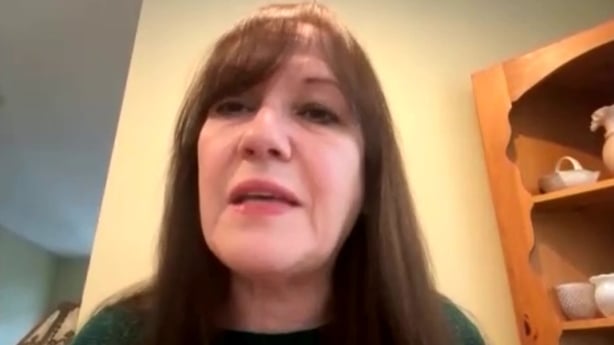The number of United States citizens applying for Irish passports hit a ten-year high last month, according to figures released by the Department of Foreign Affairs.
Some 4,327 US citizens applied for passports in February, the first full month following President Donald Trump's return to the White House, the most of any month since 2015.
It continues a trend from 2024 which saw an almost 10% annual increase in the number of applications.
Some observers are associating the surge with citizens fleeing political division and concerns about the new Trump presidency, but specific reasons are impossible to be definitive about.
Elsewhere, Daft.ie said they have seen a surge of 220% in US-based web traffic on the day of Donald Trump’s election last November.
Further spikes were evident last month after President Trump’s return to the White House, according to the property website.
Rowena Quinn, a Managing Partner in Hunter’s Estate Agents, who have offices across south county Dublin, says she’s noticed a significant uptick in interest from the US.
"The volume of telephone calls and emails into the offices has been far greater than ever, coming from all parts of the States," Ms Quinn said.
"Google searches have spiked in terms of people looking for properties in Dublin and in the greater area all around Ireland. The requests and emails, request to view, request to rent has seen an all-time high.
With Ireland’s housing market already under significant strain, Ms Quinn says that the growing interest from US buyers could have an impact, noting that many are cash buyers — adding further pressure to the market.
"We've had a couple of families rent properties from us. They've taken the rental months in advance of their relocation to Ireland," she added.
In one case, Ms Quinn says a US family has been paying rent on a property since December, despite not moving to Ireland until the summer.
In another instance, a property has been rented starting this month, even though the tenants won’t move in until July.
"It'll be quite interesting to see if those rentals will turn into purchases down the road," Ms Quinn added.
The spike in interest is not just being seen in Ireland, according to Denis Kravchenko a Business Development Director of Astons, a global immigration advisory in Cyprus which specialises in relocating US citizens to Europe.
"We've seen an insane spike in our inquiries from the US since November. You can call it Trump refugees, you can call it political instability refugees, but the result is the result. People are frustrated," Mr Kravchenko said.
"People are not sure what's going to happen. I have heard from some of the clients that they are frightened that there might be a civil war emerging," Mr Kravchenko added.
He has had interest from Americans wanting to move to Ireland, but Portugal, Greece, Cyprus and Malta are also popular.

Prime Time spoke to several US citizens about their feelings of unease about living in the US, and plans to move to Ireland.
"The new administration does seem to be focused on deliberately hurting New York and areas that didn't vote for them. They have a lot of levers they can use to make life worse here," Software engineer Jeremy Parker said.
Mr Parker and his wife Avri Beard, a university professor, are leaving their home in New York to move to Dublin this week.
"Almost anything that's making the news is something that we would object to. We are not the types to stand by quietly and let these types of things happen," Mr Parker said.
"Our choice becomes, do we go out in protest and potentially end up in jail? Or do we shut up and go along with the programme? A law like, for example, it's illegal not to report your undocumented friends. That's not something that we would go along with," he added.
After living in the New York borough of Brooklyn for 15 years, the couple will begin their new life in Ireland on Friday, initially renting an apartment in Dublin.
"People of Ireland really seem concerned about the common welfare, which is somewhat lacking in the States," Mr Parker said.

Others are not as far through the process, but developing plans to make a move.
The Foreign Birth Register allows descendants of Irish people who have moved abroad to make a claim for Irish citizenship. There were 11,601 registrations from the US in 2024 – a 50% increase on the 7,726 applicants received in 2023. So far there have been 3,880 Foreign Birth Register applications in 2025.
We need your consent to load this flourish contentWe use flourish to manage extra content that can set cookies on your device and collect data about your activity. Please review their details and accept them to load the content.Manage Preferences
That reflects a sharp rise in demand for information on ancestry-based citizenship opportunities in Ireland and across the EU, according to James P Cavanaugh, an attorney and county commissioner in Omaha, Nebraska.
Mr Cavanaugh, a registered Democrat, works with individuals seeking to ascertain rights to overseas citizenships.
"There's a huge level of rising anxiety and it's fuelled in part by Trump's statements, but also by the actions that follow. Tens of thousands of federal workers have been laid off, and that has cut the provision of human services in vital areas, from retirement, social security areas, to veterans benefit areas, to meals for children," he said.

Susan Ryall, who lives in New Jersey is one of the Irish Americans seeking her Irish passport as "an insurance policy" for the future.
A lifelong Republican, she told Prime Time she "did not vote for Trump."
"It's scary because the ideals that I grew up with my whole life [are] that the US is not a dictatorship, we're a democracy," Ms Ryall said.
Ms Ryall, who works at a senior level in a bank, has taken a major financial hit in recent days.
Like millions of Americans, she pays money into a 401(k) fund, which is an employer-sponsored workplace retirement plan where the employee makes annual contributions that are invested in stocks for later years.
"Over the years, that money accumulates, and you're supposed to build your wealth that way so that you can retire and have money when you're not working anymore," Ms Ryall said.
"It went down by 10% in the last week. I'm somebody that wants to retire in the next couple of years. So that scares me. That scares me very much," she added.
As she had Irish grandparents, Ms Ryall is among thousands of Americans entitled to Irish passport.
"I think that getting an Irish passport would be a security move for myself and my sister. That way, if we had our Irish passports, and for any reason we couldn't work over here, if anything happened, we could go there," she said.
"I have a house on a lake here, and I love it here. I grew up here and this in my country, but if it becomes completely unstable, if there was a point where I felt like I was in danger staying, I would want to have a place to go."

Professor Christopher Wheatley feels similarly. A former lecturer at the University of Galway, he says he’s considering a move back to the west of Ireland from Port Ludlow at the foot of the Olympic Mountains in Washington State, near the Canadian border.
"The administration is trashing the country. [Trump] said in a speech a couple of weeks ago that we're going to get Greenland one way or another, he's talking about invading Panama and of course, there's the ongoing insult to Canada... it adds to this whole sense that something's seriously going wrong in the country," Prof Wheatley said.
"It's a major, major move, so I'm still thinking it over and seeing what I'm going to do," he said.
"If I move to Ireland, it’ll be because I have friends there. I taught at the university there. And to do that, I'd have to sell my house. And that's a big deal. Just getting rid of a lifetime of accumulation is a daunting task."
A report from Conor McMorrow and Lucinda Glynn on the US citizens in the surge for Irish passports is broadcast at 9.35pm on the 20 March edition of Prime Time on RTÉ One and the RTÉ Player




